Sudan has filed an ICJ case against the UAE for complicity in genocide, citing support for the RSF amidst severe atrocities against civilians, particularly the Masalit group. With areas echoed in previous Darfur conflicts, support for Sudan from the Global South is critical. The case underscores the need for international accountability and challenges inherent injustices in global power dynamics.
The International Court of Justice (ICJ) has formally accepted Sudan’s case against the United Arab Emirates (UAE), accusing it of complicity in genocide. Sudan claims the UAE’s support for the Rapid Support Forces (RSF), a paramilitary group, has materially contributed to atrocious acts against civilians, particularly the Masalit group, since the conflict escalated in April 2023. This situation bears resemblance to past tragedies in Darfur, where similar and grave human rights violations occurred.
Documented reports have highlighted the RSF’s systematic violence, including mass killings and sexual assault. Between May and June 2023, up to 15,000 civilians were reportedly killed, and over 500,000 displaced. There is forensic evidence, including analyses from credible organizations such as the Raoul Wallenberg Centre for Human Rights and Human Rights Watch, attesting to these brutal actions, while satellite imagery has revealed extensive damage to civilian structures in West Darfur.
The U.N. has corroborated these claims by documenting mass graves linked to RSF attacks, coupled with survivor testimonies that suggest an ethnic targeting of the Masalit group. The U.S. State Department has labeled the actions of the RSF as genocidal. Importantly, the UAE’s involvement has also been substantiated by findings from the U.N. Security Council’s Panel of Experts, revealing that the UAE has supplied arms to the RSF from a base in Chad.
Implications of UAE complicity are severe. Investigations indicate significant flow of weapons from the UAE to the RSF, including drone technology sourced from a hidden Emirati base, which has exacerbated civilian casualties. The UAE’s geopolitical position, supported by its financial clout and alliances with Western powers, complicates the international response to Sudan’s plight.
Emerging from South Africa’s case against Israel for genocide, the Global South has an opportunity to reaffirm its unity. However, failure to support Sudan undermines this regional solidarity and perpetuates double standards in the application of international law. Recognition of Sudan’s struggle should be separate from any endorsement of its government’s actions against the RSF. The situation highlights the ongoing complexities of international accountability where strategic interests often overshadow human rights concerns.
A ruling in favor of Sudan could restore the credibility of international justice systems, making it essential for involved nations to collectively support this motion against the UAE. Reservations from the UAE regarding the ICJ’s jurisdiction under the Genocide Convention are challenged by legal scholars, as such reservations may infringe upon the treaty’s fundamental objectives aimed at preventing genocide.
In summary, a lack of decisive support for Sudan could empower larger nations to exploit the situation for geopolitical gain. This serves as a critical moment for the Global South to uphold accountability principles lest the political dynamics further marginalize Sudanese victims in favor of power play.
In conclusion, Sudan’s case against the UAE at the ICJ represents a crucial test for international accountability within the context of the Global South. Supporting Sudan not only reinforces solidarity among nations facing crises but also challenges the precarious balance of power and justice on the global stage. This case reflects wider implications for the international justice system and the need for unified action against state complicity in genocide, while also addressing the challenges posed by the UAE’s influence and policies in the region.
Original Source: foreignpolicy.com




